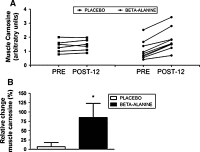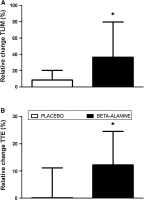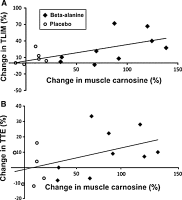Beta-alanine (Carnosyn™) supplementation in elderly subjects (60-80 years): effects on muscle carnosine content and physical capacity
- PMID: 22143432
- PMCID: PMC3374124
- DOI: 10.1007/s00726-011-1190-x
Beta-alanine (Carnosyn™) supplementation in elderly subjects (60-80 years): effects on muscle carnosine content and physical capacity
Abstract
The aim of this study was to investigate the effects of beta-alanine supplementation on exercise capacity and the muscle carnosine content in elderly subjects. Eighteen healthy elderly subjects (60-80 years, 10 female and 4 male) were randomly assigned to receive either beta-alanine (BA, n=12) or placebo (PL, n=6) for 12 weeks. The BA group received 3.2 g of beta-alanine per day (2×800 mg sustained-release Carnosyn™ tablets, given 2 times per day). The PL group received 2× (2×800 mg) of a matched placebo. At baseline (PRE) and after 12 weeks (POST-12) of supplementation, assessments were made of the muscle carnosine content, anaerobic exercise capacity, muscle function, quality of life, physical activity and food intake. A significant increase in the muscle carnosine content of the gastrocnemius muscle was shown in the BA group (+85.4%) when compared with the PL group (+7.2%) (p=0.004; ES: 1.21). The time-to-exhaustion in the constant-load submaximal test (i.e., TLIM) was significantly improved (p=0.05; ES: 1.71) in the BA group (+36.5%) versus the PL group (+8.6%). Similarly, time-to-exhaustion in the incremental test was also significantly increased (p=0.04; ES 1.03) following beta-alanine supplementation (+12.2%) when compared with placebo (+0.1%). Significant positive correlations were also shown between the relative change in the muscle carnosine content and the relative change in the time-to-exhaustion in the TLIM test (r=0.62; p=0.01) and in the incremental test (r=0.48; p=0.02). In summary, the current data indicate for the first time, that beta-alanine supplementation is effective in increasing the muscle carnosine content in healthy elderly subjects, with subsequent improvement in their exercise capacity.
Figures



Similar articles
-
Effect of β-alanine supplementation during high-intensity interval training on repeated sprint ability performance and neuromuscular fatigue.J Appl Physiol (1985). 2019 Dec 1;127(6):1599-1610. doi: 10.1152/japplphysiol.00321.2019. Epub 2019 Oct 17. J Appl Physiol (1985). 2019. PMID: 31622158 Clinical Trial.
-
beta-Alanine supplementation augments muscle carnosine content and attenuates fatigue during repeated isokinetic contraction bouts in trained sprinters.J Appl Physiol (1985). 2007 Nov;103(5):1736-43. doi: 10.1152/japplphysiol.00397.2007. Epub 2007 Aug 9. J Appl Physiol (1985). 2007. PMID: 17690198 Clinical Trial.
-
β-Alanine supplementation increased physical performance and improved executive function following endurance exercise in middle aged individuals.J Int Soc Sports Nutr. 2018 Jul 11;15(1):32. doi: 10.1186/s12970-018-0238-7. J Int Soc Sports Nutr. 2018. PMID: 29996843 Free PMC article. Clinical Trial.
-
Role of beta-alanine supplementation on muscle carnosine and exercise performance.Med Sci Sports Exerc. 2010 Jun;42(6):1162-73. doi: 10.1249/MSS.0b013e3181c74e38. Med Sci Sports Exerc. 2010. PMID: 20479615 Review.
-
Effect of β-alanine supplementation on high-intensity exercise performance.Nestle Nutr Inst Workshop Ser. 2013;76:61-71. doi: 10.1159/000350258. Epub 2013 Jul 25. Nestle Nutr Inst Workshop Ser. 2013. PMID: 23899755 Review.
Cited by
-
β-Alanine supplementation and military performance.Amino Acids. 2015 Dec;47(12):2463-74. doi: 10.1007/s00726-015-2051-9. Epub 2015 Jul 24. Amino Acids. 2015. PMID: 26206727 Free PMC article. Review.
-
Fish By-Products: A Source of Enzymes to Generate Circular Bioactive Hydrolysates.Molecules. 2023 Jan 24;28(3):1155. doi: 10.3390/molecules28031155. Molecules. 2023. PMID: 36770822 Free PMC article.
-
Combined Exercise Training and Nutritional Interventions or Pharmacological Treatments to Improve Exercise Capacity and Body Composition in Chronic Obstructive Pulmonary Disease: A Narrative Review.Nutrients. 2023 Dec 18;15(24):5136. doi: 10.3390/nu15245136. Nutrients. 2023. PMID: 38140395 Free PMC article. Review.
-
The Gut-Muscle Axis in Older Subjects with Low Muscle Mass and Performance: A Proof of Concept Study Exploring Fecal Microbiota Composition and Function with Shotgun Metagenomics Sequencing.Int J Mol Sci. 2020 Nov 25;21(23):8946. doi: 10.3390/ijms21238946. Int J Mol Sci. 2020. PMID: 33255677 Free PMC article.
-
Evaluation of supplementary carnosine accumulation and distribution: an initial analysis of participants in the Nucleophilic Defense Against PM Toxicity (NEAT) clinical trial.Amino Acids. 2024 Aug 31;56(1):55. doi: 10.1007/s00726-024-03414-5. Amino Acids. 2024. PMID: 39215872 Free PMC article. Clinical Trial.
References
-
- Artioli GG, Gualano B, Smith A, Stout J, Lancha AH., Jr Role of beta-alanine supplementation on muscle carnosine and exercise performance. Med Sci Sports Exerc. 2010;42(6):1162–1173. - PubMed
-
- Ciconelli R, Ferraz M, Santos W, Meinão I, Quaresma M. Tradução para a língua portuguesa e validação do questionário genérico de avaliação de qualidade de vida SF-36 (Brasil SF-36) Rev Bras Reumatol. 1999;39:143–150.
-
- Cruz-Jentoft AJ, Baeyens JP, Bauer JM, Boirie Y, Cederholm T, Landi F, Martin FC, Michel J-P, Rolland Y, Schneider SM, Topinková E, Vandewoude M, Zamboni M. Sarcopenia: European consensus on definition and diagnosis, report of the European Working Group on sarcopenia in older people. Age Ageing. 2010;39(4):412–423. doi: 10.1093/ageing/afq034. - DOI - PMC - PubMed
-
- Doherty TJ. Invited review: aging and sarcopenia. J Appl Physiol. 2003;95(4):1717–1727. - PubMed
Publication types
MeSH terms
Substances
LinkOut - more resources
Full Text Sources
Other Literature Sources
Medical

